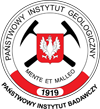Geology is essential for understanding the world we live in. Mineral wealth hidden deep in the Earth we are still trying to investigate and understand is the source of our development,
diversity of life and landscapes.
Mineral resources, reserves and production are commonly associated with geology. All of these have required a huge effort by generations of scientists who combine their scientific work with day-to-day geological services. They unveil the history of the Earth and explore for mineral deposits but also are present wherever the environment, human life or infrastructure facilities are at risk due to geologic structure or mining operations.
Polish Geological Institute has coordinated its activities in Poland for the past nearly 100 years. PGI is the oldest scientific research institute in Poland: it was established on 7 May 1919 by the Legislative Diet. In recognition of the Institute’s contributions to the development of Polish science and economy, the Council of Ministers awarded it the status of National Research Institute in February 2009.
The Institute is supervised by the Minister of the Environment, acting through the Chief Geologist of Poland.
Research projects delivered by the PGI staff led to the discovery of Poland’s key deposits of mineral resources: copper, silver, native sulphur, coal, lignite, rock salt, potash salt, iron, titanium, vanadium, zinc and lead ores. Poland is among those few countries worldwide that possess a vast and detailed knowledge of their natural environment. Several thousands of wells drilled by the Institute enabled a detailed investigation of Poland’s geology.

Polish Geological Institute operates specialised chemical, microanalytical, geophysical and engineering geological laboratories that are outfitted with the latest analytical equiipment. The microanalytical laboratory operates a SHRIMP IIe/MC ion microprobe and a CAMECA SX 100 electron microprobe. About 500,000 analysis are made in over 35,000 samples tested each year by the accredited chemical laboratory.
Polish Geological Institute – National Research Institute (PGI-NRI) is acting as Polish Geological Survey (PGS) and Polish Hydrogeological Survey (PHS). By performing the tasks of these two surveys the Institute is protecting national security in the area of mineral and groundwater resource management, monitoring the status of the environment and gives an early warning of natural hazards.
PGI-NRI is a member of EuroGeoSurveys, an umbrella organisation of European geological surveys. The Institute contributes to the efforts of expert groups that provide advice to related European Commission bodies and collaborates with several tens of geological centres worldwide.
Collecting, processing and making accessible broadly defined geological information, arising from in-house projects and provided by external entities, is the basic and key task of the Polish Geological Survey. National Geological Archive, acting in collaboration with specialised PGS and PHS units, is in charge of information gathering. The latest IT tools and database systems are used in this process. Once processed, information is automatically made available to organisational units of the Institute that are in charge of particular areas such as deposits of mineral
resources, environmental geology, cartography, geohazards or engineering geology.
Altogether, the system is performing as an integrated and effective mechanism that provides access to current and standardised geological information, in line with the efforts aiming at the implementation of the INSPIRE directive establishing a standardised infrastructure for spatial information across the EU Member States. PGI-NRI is consistently expanding the scope of processed data to enhance quality of information it provides Thanks to these efforts, PGS and PHS geoinformation products are increasingly considered as credible data of reference by
their users.
Polish Hydrogeological Survey focuses on exploration, balancing and protection of groundwater resources. Surveys and data collected by PHS are the key sources of knowledge about the status of the groundwater. Hydrogeologists systematically monitor the groundwater for quantity and quality, collect water off-take data, analyse changes in groundwater resources, prepare forecasts and draft hydrogeological maps.








